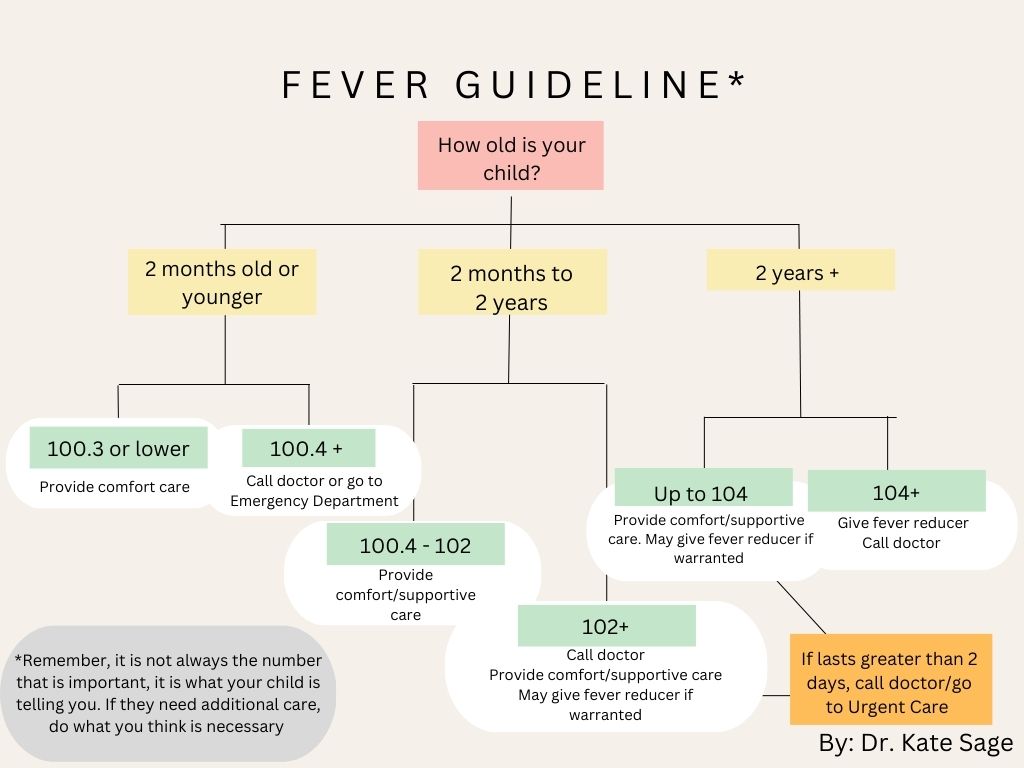With so many different viruses going around, we would be hard pressed to find a child that has not had a fever in the last few months. Do you immediately grab a fever reducing medication (like Motrin or Tylenol*) if your child’s temperature is over 99 degrees? If so, I hope this article helps you feel more comfortable in letting the fever do its job in certain circumstances or making the choice to give the medication when it is necessary. If you find yourself asking “Is my child’s fever dangerous?” then this info is for you!
Fevers are our body’s immune response to dealing with a viral or bacterial infection. Our brain changes the body’s temperature set point in response to these infections as one method to take care of the invaders. By allowing this process to happen, we let the body use one of its own best tools to get rid of the infection for good. If we stop the fever, we are turning off one of the body’s best defenses. There is a time and a place for using fever reducing medication but limiting its use is best.
Before giving your child fever-reducing medicine, ask yourself:
How sick is my child actually? A fever is technically a temperature over 100.4° with rectal, ear or temporal thermometer or 100° with oral. If an infant under the age of two months has a temperature over 100.4°, it is considered an emergency which should prompt an immediate call to your child’s physician or a direct trip to the Emergency Department. If they are over that age and running a low grade fever ( below 102°) and seemingly feeling/acting okay, you might hold off. When a child’s fever exceeds 102° and sleeping and not overly uncomfortable, you can also feel good holding off on the medication, unless the fever proceeds for more than two days. Here is the important piece – check in with your gut.
Are they bad sick? If so, this is the time to give the medication and call their doctor. If not, you can support them in other ways and let their fever ride. It is not so much the number that is important, but more how your child is looking and acting.
Am I afraid of febrile seizures? Only 4% of children have seizures with a fever. AND although they are scary, febrile seizures do not cause any long term brain damage or increase their risk for other types of seizures. In fact, if your child has a febrile seizure, as long as it lasts less than two minutes, you do not even need to take them to the Emergency Department. I acknowledge that these can be very scary to watch but I am hoping to provide you comfort to know that your child will be okay. If you would like to read more about this, you can also read this great article on fever myths from Seattle Children’s Hospital. As always, please also check with your child’s own physician as they may have other guidelines or reasons why your child may need to use fever reducers more frequently.

Alternatives to medication for fevers:
Comfort care: Anything you can provide to make your child more comfortable – snuggles, nursing, tea, soup, watching a movie with them, etc. Make sure they are drinking enough liquids, we do not have to worry about them eating solids (even in older kids/teens).
Supportive care: Herbal remedies, teas, vitamins, supplements, homeopathics, hydrotherapy, etc – anything that will support the body’s natural immune processes. Ask your child’s naturopathic physician for specific recommendations and dosages.
To recap: It is okay to give medication for a fever, but you can usually use your gut to decide when it is absolutely necessary. Your child’s body is wise and, in most circumstances, will take care of the problem. Your best job while your child is sick is to stay calm, provide snuggles and hydration, and to feel confident that you will know if and when the time comes to go in a different direction.
At Intuition Wellness Center, we specialize in health and wellness services for children, young adults, and their families. If you think you would like some extra support, we’re here for you.
Written by Dr. Kate Sage, NMD, Naturopathic Family Physician
*Ibuprofen/Advil/Motrin is a better choice for babies over 6-months and children as it is generally easier on the system. Acetaminophen/Tylenol is hard on the liver and it reduces the body’s own levels of glutathione, an antioxidant that is important for brain health.


